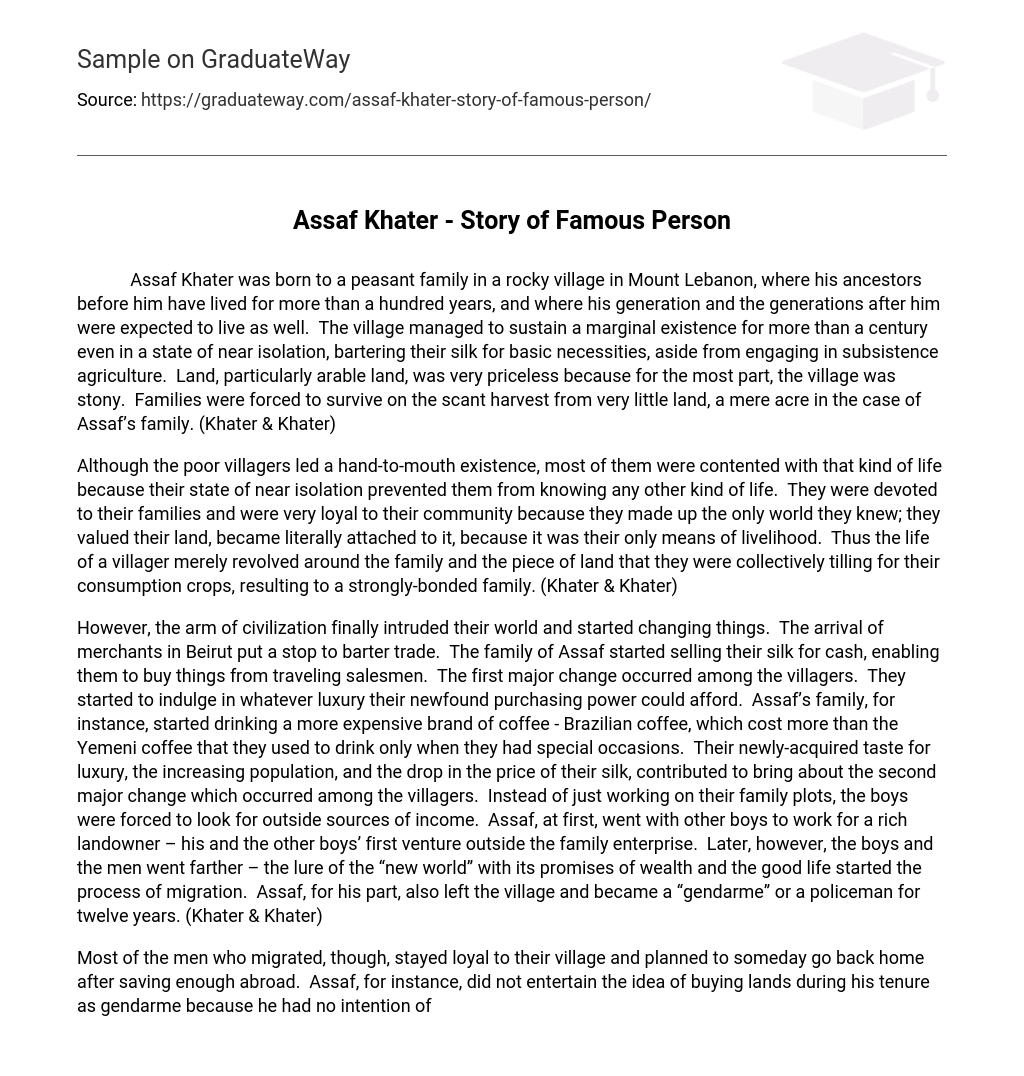Assaf Khater was born to a peasant family in a rocky village in Mount Lebanon, where his ancestors before him have lived for more than a hundred years, and where his generation and the generations after him were expected to live as well. The village managed to sustain a marginal existence for more than a century even in a state of near isolation, bartering their silk for basic necessities, aside from engaging in subsistence agriculture. Land, particularly arable land, was very priceless because for the most part, the village was stony. Families were forced to survive on the scant harvest from very little land, a mere acre in the case of Assaf’s family. (Khater & Khater)
Although the poor villagers led a hand-to-mouth existence, most of them were contented with that kind of life because their state of near isolation prevented them from knowing any other kind of life. They were devoted to their families and were very loyal to their community because they made up the only world they knew; they valued their land, became literally attached to it, because it was their only means of livelihood. Thus the life of a villager merely revolved around the family and the piece of land that they were collectively tilling for their consumption crops, resulting to a strongly-bonded family. (Khater & Khater)
However, the arm of civilization finally intruded their world and started changing things. The arrival of merchants in Beirut put a stop to barter trade. The family of Assaf started selling their silk for cash, enabling them to buy things from traveling salesmen. The first major change occurred among the villagers. They started to indulge in whatever luxury their newfound purchasing power could afford. Assaf’s family, for instance, started drinking a more expensive brand of coffee – Brazilian coffee, which cost more than the Yemeni coffee that they used to drink only when they had special occasions. Their newly-acquired taste for luxury, the increasing population, and the drop in the price of their silk, contributed to bring about the second major change which occurred among the villagers. Instead of just working on their family plots, the boys were forced to look for outside sources of income. Assaf, at first, went with other boys to work for a rich landowner – his and the other boys’ first venture outside the family enterprise. Later, however, the boys and the men went farther – the lure of the “new world” with its promises of wealth and the good life started the process of migration. Assaf, for his part, also left the village and became a “gendarme” or a policeman for twelve years. (Khater & Khater)
Most of the men who migrated, though, stayed loyal to their village and planned to someday go back home after saving enough abroad. Assaf, for instance, did not entertain the idea of buying lands during his tenure as gendarme because he had no intention of staying away from their village forever. Migration, therefore, did not acquire a permanent status among the men of the village at the time. However, the need to look for greener pastures continued to push the men out of the village to look for better jobs. Assaf did not escape the beacon. After twelve years in the gendarmes, he realized that he was not earning enough to liberate his family from poverty, so he finally decided to leave Lebanon, his wife and three children, and boarded a steamer for Uruguay where he started a new life as a peddler. (Khater & Khater)
The emigrants from the village sent back whatever amounts they could to help the families they left behind. When Assaf was in Uruguay, his family invested most of the money that he was able to send back to buy more lands. However, his extended absence (he stayed in Uruguay for ten years) resulted to a broken home. Two years after he returned to their village in Lebanon, his wife left the country for Uruguay where she later died away from Assaf. (Khater & Khater)
The story of Assaf is a story of loyalty – to one’s family, to one’s homeland. However, it is also a story of poverty and of a people’s struggle to be free of it – even if it takes leaving their homeland behind; even at the risk of fragmenting their families. Migration during the 18th and 19th centuries offered great opportunities for poor people from poor countries of the world to seek better prospects abroad. Migrants did not only leave their homelands behind – they also left their old lifestyles and old occupations. Assaf, who was a peasant, became a policeman and later a businessman in his search for a better life. (Khater & Khater)
Work Cited
Khater, A.F. & Antoine F. Khater. “Assaf: A Peasant of Mount Lebanon.”
PreColonial Lives.





